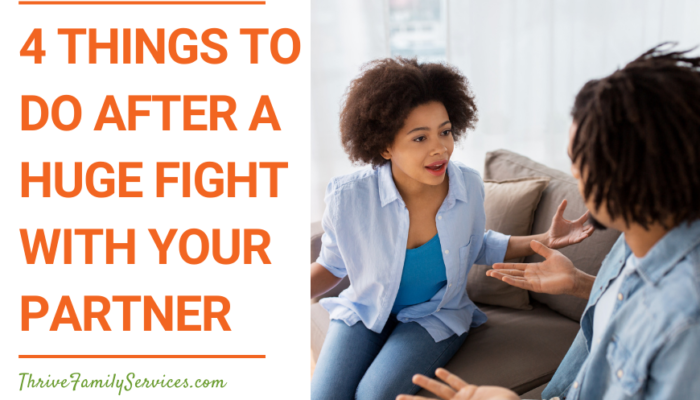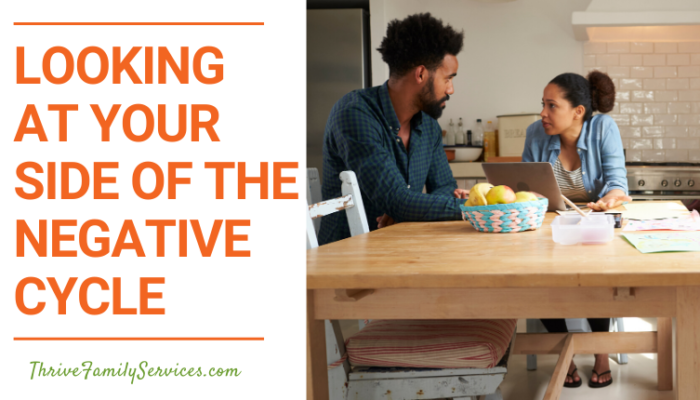Chances are, if you’re in a relationship with someone, you’ve had to deal with your share of disagreements or fights. No one likes to fight with their partner, but it’s just not realistic that two people would see eye to eye on everything all of the time. Fighting in a relationship is normal, although it can be hurtful. One of the hardest parts of having a fight with your partner is figuring out how to repair after the fight. Without a resolution, you might be simply setting yourself up to have the same fight again down the line. Although it might seem intimidating if you’re not in the habit of it, it is possible to repair after a huge fight with your partner.
Here are four things our Emotionally Focused couples’ therapists recommend you do to repair your relationship after a big fight.
1. Tell your partner how much they mean to you
When you fight with your loved ones, your brain can pretty much short circuit. Threats to our most important relationships are coded in the brain like a danger cue, and the brain can automatically flip into fight or flight mode. In order to stop a fight from spiraling, your brains need help.
One of the best ways to do this is to reach out to each other in soft, reassuring ways that communicate love and how much you mean to each other.
Saying “sorry” isn’t enough. A heartfelt apology is great and certainly cannot hurt. However, an apology feels hollow or may fall flat if your partner is struggling with what can feel like a life or death question such as, “Do you still love me?” “Do you like me?”
If you are feeling so hurt or angry that it is difficult to be soft and reassuring, try saying both how angry you feel, but also how much you care about them.
Remember, feeling angry is not the same as acting aggressively.
If you find that it is really uncomfortable for you to speak this way to your partner, I encourage you to consider some couples counseling to better understand your own relationship to feeling feelings and sharing them.
If you were not taught to share emotions (or taught NOT to share them), counseling can go a long way in helping you understand those blocks inside and begin to open up to your partner.
2. Be willing to own your part in the fight
You may feel the trigger or triggers for the argument are clearly the fault of your partner. However, resist the urge to blame it all on them and be willing to own up to what you may have done to contribute.
One concept we’ve learned from the Girls Leadership Institute is the “Double Sorry.” This has been such an effective tool with our kids and their friends that we now use it with our friends and in our marriage.
A Double Sorry (or Triple, or Quadruple) is when each person apologizes for what they did or didn’t do that contributed to the fight.
We can always find something we can offer to the person who means a lot to us, even if it is owning that we haven’t been as attentive to them as we want to be, or noticing all the good things they do. This act of generosity can go a long way to mend hurts.
3. Identify ALL the feelings you are experiencing
Ask yourself, “What am I feeling on the inside that I’m not talking about?”
When you are angry or critical, you often have other feelings inside, underneath or part of the anger that your partner is not seeing.
Maybe you are also feeling a fear that your partner does not care about you. Maybe you feel powerless to let your partner know that you care. If you typically shut down or withdraw, maybe you are feeling protective over the relationship because you fear the argument will damage or even end the relationship.
We seldom feel just one feeling at a time. Yet, we often send messages in a huge argument of just anger, just criticism, or just withdrawal.
Underneath, however, there are often softer, more vulnerable feelings your partner REALLY needs to hear in the heat of an argument. Feelings like hurt, loneliness, fear of losing your partner, or longing for comfort or reassurance.
When you can give your partner a more complete understanding of all of your feelings, including those softer ones, you are much more likely to get the response you want from your partner.
Showing them anger, criticism or withdrawal alone will likely only give you more of a fight.
Better yet, work on leading with those softer, more vulnerable feelings. Many arguments can be avoided while strengthening the bond with our partner when we take a risk and lead with our heart by sharing things like:
“I need you. I get scared when I can’t find you or reach you.”
Again, if this feels uncomfortable or awkward to you, get some support from a couples counselor. Or, find your own words or ways to send this message to your partner.
4. Get support from a couples counselor if you need it
One silver lining to a huge fight is that it can provide the momentum necessary to overcome the inertia that can happen when we are having problems in our relationship.
It is human nature that we get stuck in ruts and return to our comfort zone of living like roommates who sometimes argue. The hurts and problems get swept under the carpet and we are back at square one, with the next fight festering under the surface.
Seeking out couples counseling to help you understand, talk about, and heal from your huge argument can be a turning point in your relationship. Riding the wave of the fight into couples counseling can lead to a closer, happier and more secure relationship in the end.
One caveat to this post is if your argument turned physical for either or both partners. If you have experienced domestic violence in your relationship, please seek help at once from a qualified couples counselor trained in helping couples where violence has occurred. If you are in the Denver area, you can contact Safe House Denver for emergency shelter or resources. Outside Denver, you can contact the National Coalition Against Domestic Violence.
Contact us today to get your relationship back on track or even stronger after the big fight. We offer counseling appointments in Greenwood Village in the heart of the Denver Tech Center.




